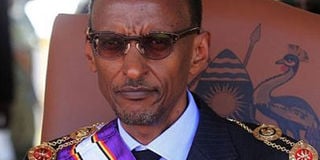Prime
Rwanda reconsiders role of snubbed French language

President Paul Kagame, who was educated in Uganda, made English an official language alongside the country's first language, Kinyarwanda, and French. Net photo
Rwanda turned its back on the French-speaking world when it chose English as the language of education a decade ago, but with bilingualism seen as an asset French is reviving.
As the language of coloniser Belgium, French began losing ground to English in the aftermath of Rwanda's 1994 genocide when a new political elite, dominated by anglophone Tutsi refugees, took charge.
Underpinning Rwandan antipathy towards French was the accusation of France's complicity in the genocide that killed at least 800,000, mostly Tutsis.
In 2003, rebel-turned-president Paul Kagame, himself a Uganda-educated Tutsi, made English an official language alongside the country's first language, Kinyarwanda, and French.
Five years later English replaced French as the language of education.
At the same time, Kagame's government began conducting official business in English, although laws continue to be published in all three official languages, with Swahili added as a fourth last year.
The pivot away from French language and influence deepened with Rwanda's joining of the anglophone East African Community regional bloc and the Commonwealth club of former British colonies.
Renewed French vigour
But Rwanda's top diplomat, now vying to lead the International Organisation of La Francophonie (OIF), the world association of French-speaking nations, said rejecting the language was never the plan.
"This is a misinterpretation, it was necessary for Rwanda to try to be part of this club of English-speaking countries," foreign minister Louise Mushikiwabo told AFP, in a French-language interview ahead of October's vote.
"The interpretation that suggests that Rwanda turned to English against French may have been the result of relations between France and Rwanda," the long-serving 57-year-old added.
"I think there was confusion between the relations of Rwanda and France, and the relations of Rwanda with the Francophonie."
The abrupt change in the language of primary education has had its problems. A shortage of anglophone teachers meant many were forced to teach subjects in a language they had not mastered.
Despite an enthusiastic embracing of English, French has lingered and recently rallied.
The vast majority of Rwandans speak Kinyarwanda primarily or exclusively, but in 2015 the OIF estimated that 700,000 Rwandans, or six percent of the population, were French-speaking making it still the most popular foreign language, ahead of English.
French news and satellite television channels are widely viewed and French newspapers and books fill bookshops in the capital Kigali. French has also been reintroduced to the primary school curriculum -- but as a foreign language -- and the French school in Kigali, which reopened in 2010 after four years closed, is oversubscribed with Rwandan students.
At the crossroads of the two world
"It depends on the audience. If you want to speak to Rwandans about simple, clear, understandable things, you use Kinyarwanda. If you want to speak to a class that is a little more cultivated, a little more international, you write in French," said Antoine Mugesera, a Rwandan historian.
He added that transcripts of Rwanda's long and rich oral history exist in French, not English.
"It's a heritage that we must carefully protect," he said.
French-English bilingualism, adopted by the Rwanda elite, is the true social marker, but French maintains a noble image.
"It's true that when you speak French, people immediately assume a certain level of education," said hip hop poet Eric Ngangare, known as "1key".
Bilingualism is simple pragmatism for a small country seeking to grow, to extend its influence and ties, argued Mushikiwabo: "The omnipresence of English is perhaps inevitable, but that does not mean that the French language can not assert its advantages, its assets."
"We are at the crossroads of both worlds," said Mugesera. "One language is poverty, two languages is wealth. We have to keep both, that would be a huge asset for us."




